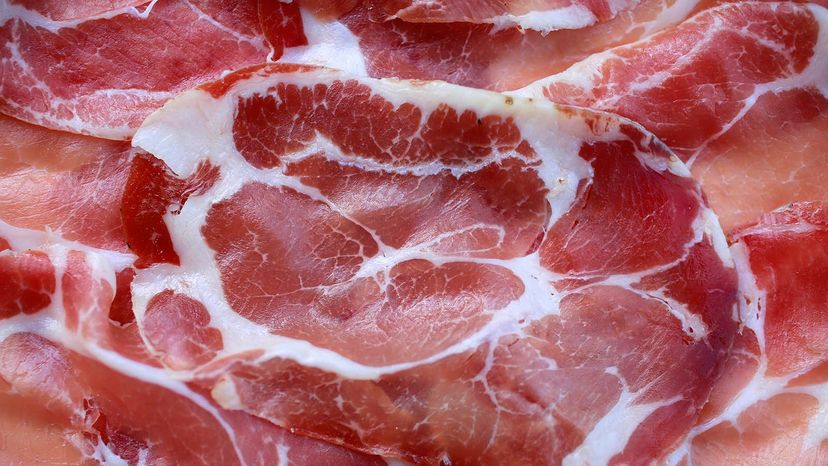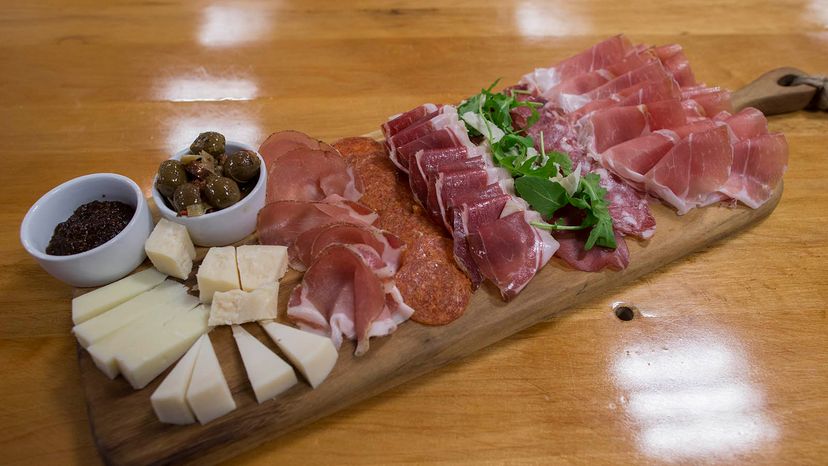 “Capicola, or capocollo, is an Italian chilly lower historically made out of the cured muscle of the neck and shoulder of the pig. Owen Franken/Getty Pictures
“Capicola, or capocollo, is an Italian chilly lower historically made out of the cured muscle of the neck and shoulder of the pig. Owen Franken/Getty Pictures
A few of the hottest meals within the U.S. at present come from Italy. Suppose pasta, mozzarella and gelato. The boot-shaped European nation can also be well-known for its cured meats. However whereas many People are acquainted with Italy’s prosciutto and pancetta, each of which come from pigs, fewer know a lot about capicola, one other pork product.
Capicola – which can also be known as capocollo and coppa – is made out of pork shoulder. Particularly, the world between the pig’s neck and its fourth or fifth rib. The meat on this a part of the pig is 30 % fats and 70 % lean, a fats ratio that ensures the meat will stay moist and tender after drying. Probably the most prized capicola comes from pigs which might be at the least eight months previous, weigh a minimal of 300 kilos (136 kilograms) and have been raised in southern Italy, thought-about the birthplace of this long-made deal with, in accordance with Mashed.com.
It is fairly straightforward to make capicola. You’re taking some pork shoulder, then add salt and varied spices, reminiscent of coriander, fennel, cinnamon, nutmeg, cloves or paprika. Some folks use pink or white wine within the course of. Within the U.S., it is typically made with pink pepper or black peppercorns, lending it the nickname "sizzling capicola." The spices you employ all rely upon your style buds. Or, in Italy, your locale.
In Umbria, a area in central Italy, coriander and fennel are the favorites. In Basilicata, to the south, sizzling pepper powder is the norm. "I like the model from Calabria, with chili powder," emails Judy Witts Francini, founding father of Divina Cucina, which provides on-line Italian cooking courses and culinary excursions. Calabria is legendary for its chili peppers, she says, including some Italians merely use salt and a Tuscan herb mix of rosemary and sage.
As soon as you have seasoned the pork shoulder, place the meat in a pure casing, then tie it up and cling it to dry, ideally for about three months.
Like prosciutto, capicola usually comes thinly sliced, and has a equally delicate, melt-in-your-mouth texture. It additionally might style smoky. And even when it is on the spicy aspect, it’s going to nonetheless style smooth and lightweight.
One of the apparent methods to serve capicola is as a part of a charcuterie board. However there’s a lot extra you are able to do with this versatile meat. For breakfast, you’ll be able to add it to omelets or breakfast sandwiches. For lunch, it really works nice in sandwiches and paninis (capicola is without doubt one of the substances within the muffuletta, by the best way, a preferred deli sandwich created by Italian immigrants who settled in New Orleans).
 “Capicola, seen right here to the precise of the pepperoni within the center, is commonly the star of the charcuterie board surrounded by different meats, cheeses and condiments.Rick Madonik/Getty Pictures
“Capicola, seen right here to the precise of the pepperoni within the center, is commonly the star of the charcuterie board surrounded by different meats, cheeses and condiments.Rick Madonik/Getty Pictures
At dinnertime, you should utilize capicola as an appetizer, wrapping it round dates or asparagus spears. And in terms of entrees, the chances are infinite. However a number of concepts embody sprinkling it onto pizzas or pasta, incorporating it into hearty salads or utilizing it to stuff hen breasts.
Since capicola is relatively salty, it pairs effectively with meals reminiscent of cheese, figs, olives, melon, breads and crackers, and full-bodied wine. However some folks say to watch out how a lot capicola you eat. The cured meat has a excessive fats content material and is exceptionally salty. To wit: There are 540 milligrams of sodium in a 1-ounce (28-gram) serving, which is about 25 % of the FDA’s beneficial every day consumption of lower than 2,300 milligrams.
Whereas it is true capicola is probably not the healthiest meals on the market, Francini notes most individuals aren’t consuming a variety of it in a single sitting. Nor are they consuming it every day.
Anxious to check out this Italian delicacy? Within the U.S., it’s possible you’ll not be capable of discover it in your native grocery retailer. Nonetheless, it’s best to be capable of snag some out of your native deli or Italian store. It is also obtainable on-line. However in the event you’re having a tough time discovering it, you simply might have to go to Italy, the place capicola is available.
Francini additionally says there is a new development afoot. Italian butchers are actually creating restaurant area of their outlets, the place they serve up tasting trays of their artisanal merchandise – together with, after all, capicola. Mangia!
Now That is Humorous
Within the U.S., it’s possible you’ll hear capicola referred to as gabagool or gobbagoal. Huh? Many Italian-People pronounce sure phrases – particularly these associated to meals – with an accent that developed through the years as Italians with regional dialects immigrated to the U.S. Within the case of capicola, sure Italian-People will pronounce the onerous "c" as "g," the "p" as "b," the "o" as "ooh," after which drop the final vowel. Et voilà – capicola turns into gabagool. This pronunciation was popularized within the TV present "The Sopranos."























